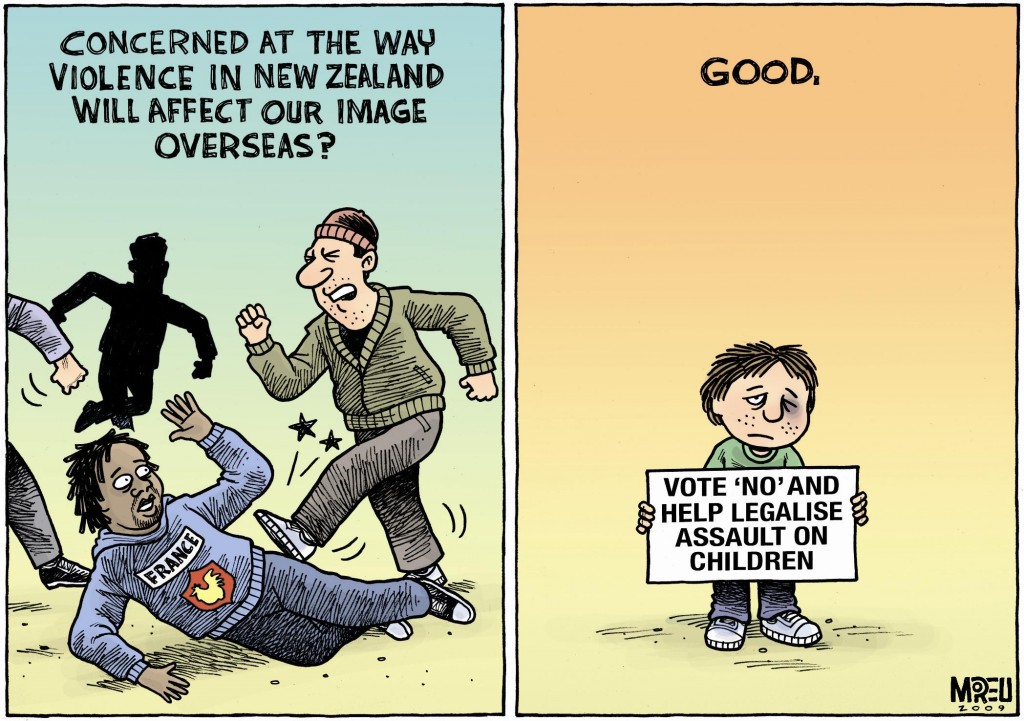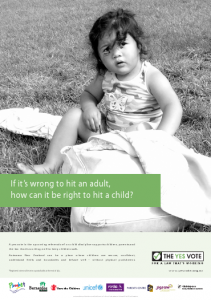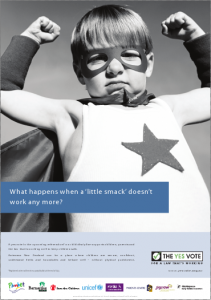Mike Moreu cartoon on the nail
June 23, 2009

Mike Moreu's cartoon in Wellington's Dominion Post (June 23, 2009)
June 23, 2009

Mike Moreu's cartoon in Wellington's Dominion Post (June 23, 2009)
June 23, 2009
Media release, Tu Wahine Trust. 22 June 2009
‘Tick Yes for Tikanga Maori’ is the message being promoted by Tu Wahine Trust in West Auckland in response to the upcoming referendum. Maori must reject the law that sanctions the abuse of our tamariki and vote YES to help restore our cultural well-being practices says Sue Ngawati Osborne, child advocate (Maori) who is hosted by Tu Wahine Trust in Waitakere City.
“Hitting children is not part of traditional Maori child-raising practice – this would be like striking a tupuna (ancestor/grandparent) in the old days.” says Sue Ngawati Osborne. “Maori children are seen as carriers of whakapapa and mana which must be protected and honoured.
“Observations from prominent European settlers of the 1800s confirm that Maori treated their children with great respect, love and devotion – and not only to their immediate offspring. In fact the settlers were surprised to see just how indulgent Maori men were to their children and of never seeing a child being struck are a couple of examples that reveal a history of non-violence towards children uncommon to the Europeans who observed it.
“The law on child discipline was imposed on Maori by the early settlers and has had disastrous effects. Now, more than 160 years later, child maltreatment and abuse is a huge issue for Maori to overcome.
“What is helpful is that Maori have the knowledge, traditions and expertise within their own communities to counter this law, apply cultural healing and eliminate violence against tamariki.”
There are Maori service providers in the community such as Tu Wahine Trust who are there to help rangatahi (young people) and whanau with parenting programmes and violence prevention programmes to keep our tamariki safe, she said.
Tu Wahine Trust supports the approach of Te Kahui Mana Ririki who state: “Smacking is simply another expression of violence against Maori children. If we can break the habit that our whanau have of hitting children, then more serious forms of abuse and maltreatment will also reduce.”
By voting YES to the referendum question, we can all play a part in restoring the status of our tamariki as taonga (treasures) who live free from violence and abuse.” says Ms Osborne.
June 22, 2009
Press Release: Green Party 21 June 2009
Today New Zealand celebrates two years of positive change for children since the law changed to give children the same legal protection from assault as adults.
New Zealanders should be proud of the progress made in positive child rearing practices with a clear message getting through that the use of force for correction is never justified, said Green Party MPs Sue Bradford and Metiria Turei.
The pair are heartened to celebrate two years of a safer world for our children and young people.
The 2007 amendment removed a legal defence that saw parents who had beaten their children claim a defence of ‘reasonable force’ and escape criminal convictions.
Ms Bradford said the law change is her most significant achievement as an MP, but she cannot take all the credit.
“I’m conscious that it’s a major social reform only brought about through the dedicated work of many individuals, community and church organisations – and MPs.
“But none of us can rest on our laurels.
“It is important now to continue to progress from this positive move and to ensure that the law continues to afford children the greatest possible protection.”
All the evidence so far – including three police reviews – shows the new law is working well. An array of Non-Governmental Organisations – such as Plunket, Barnados, Save the Children, Unicef, Jigsaw, Women’s Refuge and Parents Centre – have joined forces to promote the YesVote campaign, said Green Party Co-Leader Metiria Turei.
“Our MPs will vote ‘Yes’ in the coming referendum despite the confused and ambiguous question. We recognise that the referendum is a misguided attempt to return our law to the 19th century. On this two year anniversary, we celebrate how far our country has moved to create a safer world for children and young people.”
The young people of New Zealand will look back on the law change as a pivotal seachange in our country’s culture, Mrs Turei said.
“I’m proud of the work our party has done, and the achievements we’ve made with that law change. I’m proud of the work of Sue Bradford, in leading that change for the Green Party and for the community. Our kids will, in time, recognise the importance of this law change too.”
June 21, 2009
Deborah Coddington (New Zealand Herald, June 21, 09) decries the “dastardly” referendum in her regular column saying it was organised “by grown men who should know better”.
She says there is no such thing as a “loving smack, just as there is no such thing as a hateful hug” adding that it was no wonder children were “not valued as individuals in this country, but instead as some sort of chattel belonging to adults”
“We do not own our children,” she says, “a fact that has yet to be driven home to those selfish individuals who fight their way through the Family Court over who has the offspring, ensuring any remaining family happiness is destroyed forever.”
She goes on to argue that she doesn’t see a future in NZ for treasured children nor respect for their presence.
She admits she gave little thought to the issue until 10 years ago when she wrote about the death of James Whakaruru and realised how “normal it was for discipline to include beating children”
She concludes asking how we would react if the question was: “Should forced sex, as part of a good marriage, be a criminal offence in New Zealand?”
June 21, 2009
In his column in the Sunday Star Times (21/6/09) Finlay Macdonald takes apart the referendum question calling it “ambiguous” and “an indictment of the intelligence of those behind it”. Instead he suggests his own question: “During a recession, should the linguistically challenged be allowed to waste taxpayers’ money on pushing their reactionary agenda?”
No thinking person, he writes, “regardless of their personal parenting philosophy” could answer the referendum’s question in good faith.
He concludes by saying: “All the law now states is that nothing in all that “justifies the use of force for the purpose of correction”. In other words, if you belt your kids just to teach them a lesson, rather than to prevent some clear and present danger or disruption, the law is not necessarily on your side.
In their continuing resistance to such healthy reform and their lamentable inability to even mount a coherent argument against it, the backers of this referendum disqualify themselves from any claim to have the best interests of children at heart.”
June 21, 2009
Media Statement: The Yes Vote Coalition 21 June 2009
Debate ahead of the August referendum on the child discipline law risks being the same polarising, wasted opportunity as it was in 2007, says the Yes Vote coalition.
“The Yes Vote welcomes the fact that all political parties, except Act, have pledged their support for the child discipline law, which came into effect two years ago today.
“While the last week has been an important demonstration that our political leaders understand the importance of retaining the law as it is, the debate has reignited some of the angry and abusive tone that characterised debate in 2007…
“The reality is that when it comes to stopping New Zealand’s appallingly high rates of child deaths and abuse by international standards, we are all on the same side,” said Yes Vote spokesperson Deborah Morris-Travers.
“Yet some of the mud slung at supporters of the current legislation obscures this important fact of national unity.
“We have never promoted the view that simply passing a law would either instantly change attitudes or national child abuse statistics. To expect that would be naïve. However, opponents of the law continually cite individual abuse cases as “evidence” the law isn’t working,” said Ms Morris-Travers.
“There is a slow shift occurring in New Zealand, which has already occurred in many countries, away from physical discipline as an acceptable element of parenting. The child discipline law has an important contribution, over time, to reducing the attitudes and behaviours that put children at risk of abuse.
“I suspect that in 10, 20, 30 years time, we will look back with the same surprise as we now look back on racial segregation, opposition to the women’s’ movement, or native forest clear-felling and we’ll wonder what this debate was all about.
“Change takes time and leadership. The Yes Vote welcomes the political leadership shown over the past week.
“We have noted the many public statements from journalists and MPs expressing disapproval of the referendum question and of the cost, however, we see this as an opportunity to better inform people about the child discipline law, how it is working two years on, and the importance of ensuring a focus on the interests of children.”
Ms Morris-Travers concluded by saying, “We look forward to constructive participation in a national debate as the referendum unfolds and we remind people there are some good reasons to vote in the referendum, to support a Yes Vote:
June 21, 2009
The value of the referendum is undermined by having a loaded and ambiguous question. It implies that a “yes” vote supports criminal sanctions being applied against good parents who lightly smack their children. I do not believe that should happen or is happening.
By voting “no” the implication is that the law should be changed. I believe the law as it is is working well and does not need to be changed. Parents who beat their children can no longer hide behind the legal defence of “reasonable force” and will, where the circumstances justify it, face charges.
Since the law has passed however, good parents have not been criminalised for giving their children a light smack, despite fears whipped up by the law’s opponents.
June 19, 2009
Recently Napier City Councillor Maxine Boag was a guest on Newstalk ZB following commentator Dr Robin Gwynn the previous day on the same topic. This is a transcript of her two-minute thought for the day.
“Good morning, I’m Napier City Councillor Maxine Boag.
This week I received a flyer with a figure looking like an orange plastic ginger-bread man asking the question “Should a smack as part of good parental correction be a criminal offence in New Zealand?”
My first reaction was: “What a dumb question!”
It’s like that old set-up question: “Have you stopped beating your wife?” In which case a “yes” answer shows you have been beating her, and a “no” is an admission that you are still beating her.
But this dumb question is what we’re being asked to vote on in a postal ballot in July. It has been prompted by a nationwide petition that was launched in response to the 2007 [changes to the] Child Discipline law. At the cost of $9 million to taxpayers, this poorly-worded referendum has been criticised by both the Prime Minister and the Leader of the Opposition, both of whom saying that they will not be voting in it, with the National-led government saying they will not be changing the law regardless of the outcome.
The question is very misleading.
First of all, many of us believe that a smack is not part of good parental correction. So if you say ‘yes’ or ‘no’ you are still agreeing that a smack is good parental correction. A recent study of pre-schoolers’ parents in Otago showed that only a tiny minority of parents actually thought smacking was a good thing for them to do, and just 9 per cent thought smacking was effective in disciplining their children. Most parents said that smacking was more to do with their own state of mind, their tiredness and frustration, than the child’s behaviour.
Secondly, since the 2007 child discipline law, the use of a “smack” has not made any parents criminals. No parents who occasionally smack lightly are being prosecuted. So if you say ‘yes’, you are saying anyone smacking their child will be considered criminals, when they’re not. If you say ‘no’ you again buy into this lie.
I heard the organiser of the petition, Larry Baldock on the radio just yesterday being asked if he could give a single example of where a parent has been criminalised for smacking a child and he couldn’t!
I rest my case.
It made me think back to my own primary school days, when I was strapped often, always for talking.
Did it work?
Did it shut me up?
I’ll leave the answer for you to decide.
I’m Maxine Boag, and that’s my thought for today.”
June 19, 2009
Thanks to modern technology, we’ve made it easy to send an email your Member of Parliament and send them a clear message in a way that a poorly worded referendum can’t.
Just click over to our email your mp page, and let our wizard help you write your email.
Tags: email ,member of parliament ,mp ,wizard
June 19, 2009
And another two posters for your viewing pleasure…
If it’s wrong to hit an adult, how can it be right to hit a child? |
What happens when a little smack doesn’t work anymore? |
You’ll find more posters and free stuff on our free stuff page.
Please note: if you plan on distributing significant numbers of copies of any items from this site, please let us know so that we can include these items in our electoral return of expenses. See the notes under “Legislative requirements” in our Legal Disclaimer for more info.
Unfortunately, we don’t have the resources to post these items out to people, but you are free to download them, print them, and use them in whatever responsible way you see fit. Depending on stock levels, you may be able to get these items from your local Barnardos office.
[contact-us]
Tags: free stuff ,poster ,smacking